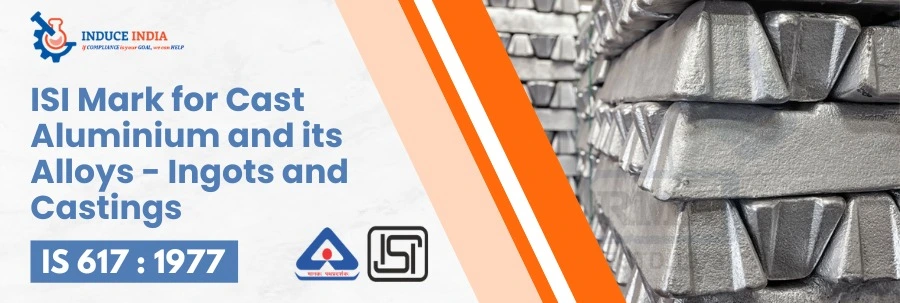Various industries use Cast Aluminum and its alloys in wide range of applications in both form of ingots and castings. If we talk about various industries Cast Aluminum and its alloys are used in Automotive Industry in Engine Components and wheels. The Aerospace Industry used Cast Aluminum and its alloys in Aircraft Components. It is widely used in Construction and Building for Architectural Castings.
Electrical Industry used Cast Aluminum and its alloys for Power Transmission. It is used in consumer goods as cookware and electronic housing for lightweight products and many more industries like marine industry, sporting goods, transportation, medical equipment, general manufacturing, etc.
Role of BIS for Cast Aluminium and its Alloys – Ingots and Castings – IS 617:1977
Considering the vast use of Cast Aluminium and its Alloys – Ingots and Castings in various industries BIS has made Cast Aluminium and its Alloys mandatory for BIS Certification as per Indian Standards IS 617:1977. As the world continuously focused on safety and quality, product testing and certification plays the most important role to ensure that the product we are using is of quality and safe to use.
As we know the BIS, Bureau of Indian Standards is national standard body of Indian government, its role is to develop many standards to ensure the safety and quality of the various products we are using in our daily life and purchasing from the market.
In this blog, we will understand importance and advantage and why BIS certification is mandatory and useful for cast aluminum and its alloys – Ingots and Castings.
Mandatory BIS Certification for Cast Aluminium and Its Alloys
1. Quality Assurance: Quality Assurance plays the most important role as cast aluminum and its alloys are used in several critical applications such as construction, medical automotive and aerospace, etc. BIS Certification ensures that cast aluminum and its alloys meet the stablished quality standards set BIS and it assures the customers for their safety and reliability.
2. Compliance with Regulations: BIS Certification for any product also ensures compliance with regulations set by the government. In the other hand products with non-compliance can face the legal consequences that includes fines and even product recalls. So, the manufacturers must use BIS standards to continue their product selling their product in the market legally.
3. Consumer Trust: Whan any product carries ISI Mark; it means that product has qualified all the rigorous testing, and it meets the specified standard. ISI Mark on any product helps the consumers in their decision-making process to purchase that product.
4. Global Market Access: ISI marked products are also recognized at the level of the global market. Many international markets demand products that are of quality and meet all the specified standards and are certified by BIS. BIS Certification gives manufacturers access to the global market to sell their products.
Advantages of BIS Certification
1. Quality Assurance: As we know BIS certification guarantees that the products meet specified quality standards. When you get BIS Certification you are allowed to adhere to the ISI mark on your products which assures the quality of the products.
2. Safety: Safety is the most important when it comes to products like cast aluminium and its alloys as it used in various industries for critical applications. If the manufacturers acquire BIS Certification that means the products, they are manufacturing is safe to use and they undergone all the safety tests.
3. Market Access: BIS certification helps the manufacturers to sale their product to international markets. This can significantly expand a manufacturer’s customer base, potentially leading to increased profits and growth at the international level of market.
4. Competitive Advantage: In a competitive marketplace, having BIS certification can set a company apart from its rivals. It can be used as a marketing tool to demonstrate superior product quality and gain a competitive edge.
5. Legal Compliance: Product with ISI mark shows that it is BIS Certified and it helps the manufacturers to avoid the issues and penalties. It ensures compliance with government regulations and industry standards.
6. Reduction in Rejections: Products with ISI mark are the preferred products in the market and are less likely to be rejected due to quality issues. BIS Certified products increase the trust of the consumer.
ISI Marking
Along with ISI mark the following details has to give in the packaging of finished good
Compliance with Indian standard specifications must be observed during the marking, labeling, and packaging process. Furthermore, the product may bear the BIS Standard Mark for added assurance.
• Identification and classification
• Net mass of each package (with serial number)
• Lot/batch number
• Transportation, handling, storage specifications and consignment of proper case.
ISI Mark Process for Cast Aluminium and Its Alloys
Obtaining ISI Mark Certification for your product involves a series of steps and compliance with specific guidelines set by the Bureau of Indian Standards (BIS). Here’s an overview of the process:
- Documentation
- Application Submission
- BIS Audit
- Sample Testing
- Grant of License (within 5-10 days)
The procedure for BIS ISI Mark Certification is different for Domestic Manufacturers and Foreign Manufacturers. To see detailed information about procedure for ISI Mark Certification visit ISI Mark Certification for Domestic Manufacturers and ISI Mark Certification for Foreign Manufacturers.
Required Documents for FMCS ISI Mark Certification
Due to the recent implementation of the BIS online application system for information gathering and management, the documentation aspect of the FMCS system for BIS is relatively uncomplicated.
- Proof of factory or company registration documentation.
- A flowchart detailing the manufacturing process.
- Information about on-site manufacturing capabilities and, if applicable, any outsourcing arrangements for manufacturing.
- Documentation demonstrating the presence of adequate testing infrastructure.
- Records of quality control (QC) metrics and their historical data.
All required documents, including the test and inspection schedule, annual labeling charge, laboratory product test report, and any other data complying with BIS standards, are accessible upon request from BIS. The complete list of documents is available upon inquiry.
To see detail information, you can visit here.
Required Documents for ISI Mark (Domestic) Certification
- Premises Documents
- GST Certificate
- MSME Certificate
- Test certificate copy of each raw material
- Process Flow Chart
- Layout plan of the factory indicating the office, lab storage area, production area, etc.
- List of manufacturing machinery.
- List of raw material.
- List of testing equipment.
To see detail information, you can visit here.
Conclusion:
Mandatory BIS certification for cast aluminium and its alloys, as per IS 617:1977, is essential to ensure the quality and safety of these products. Obtaining BIS certification not only facilitates market access but also provides a competitive advantage and peace of mind to manufacturers and consumers alike.
It’s often beneficial to consult with BIS Consultants, such as INDUCE INDIA, to navigate the complex certification process effectively.
These consultants can provide guidance, assistance with documentation, and help you understand the specific requirements of the ISI certification process, ensuring that your application is complete and meets all necessary criteria. For more information feel free to contact us call at +91-7503304082 or email at [email protected]



